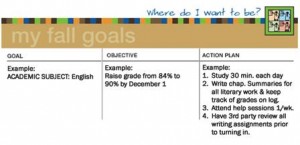A guest post by Victus Instructor Brooke Ballenger
What steps do you take to write an action plan for the goals that you set in your life?
Last month I wrote about the importance of reviewing the goals and objectives that your family has set for the summer, and why it is good to share our goals with someone else. I mentioned that students who take time for detailed planning often see the best results.
This is true because a detailed plan functions like a road map. When you are driving to a destination and do not know where you are going, you may feel anxious. At the very least, you might get lost, if you aren’t lost already! You inevitably waste time and end up feeling frustrated.
The same is true of taking on a task such as study without a plan. Lack of planning in school can cause undue anxiety, and students may become overwhelmed. I remember one day opening the cabinet in my classroom and thinking about everything I had to do that week. I felt bombarded from all sides with my mental list, and I was weary.
Then I heard Susan Ison’s voice in my head, “What’s your action plan? Figure out what it is and write it down.” All of my anxious thoughts about this mountain of responsibilities melted away, and I thought, that’s it: don’t just make a to-do list, which sometimes can heap on the apprehension, but make a plan instead!
Action plans can be written to suit the various spheres of responsibility in our lives. For students, these most likely are school, family and extracurricular activities. Remembering that a SMART objective is specific, measurable, attainable, realistic, and time-bound, write your action plan to accomplish those SMART objectives. What you write in your action plan should be specific, and it should have a date that is tied to the timeframe you have established in your objective. Action plans provide the steps as to how you will accomplish your objective.
For example, when writing an action plan for the first semester, a student may have an objective to make a 95 in history class. The action plan should include specific actions that will be performed during the first semester to attain that 95. In order to make this grade, certain component skills must be mastered along the way. As the student receives more information from the teacher regarding the class objectives and assignments, he can review his action plan and make adjustments.
A sample action plan for this student’s history class could look like this:
During the first semester, I will:
- Attend tutoring sessions twice a month
- Review notes daily for 15 minutes
- Complete readings before class
- Turn in all assignments on time.
Encourage students to write an action plan for each of their subjects. This will help them realize the importance of taking time to think about all of their classes before school is in full swing. Writing down their plans increases the likelihood they will carry them out, and this will decrease anxiety. Students who plan well can get more sleep and worry less before tests because they are better prepared.
In addition, students with extracurricular responsibilities such as sports or musical groups will benefit from making a separate action plan for these activities. I find as a teacher that students often struggle with balancing academic and athletic commitments. Writing an action plan will help them see whether they have time for everything they have committed to do, as well as aid their success. It is important that students also remember to plan time for family and friends, and this may require a separate action plan as well.
A good question to ask yourself is how often you should write action plans. For students, an obvious time to do this is the beginning of each school year. It may be helpful to break that down into nine-week quarters. In this way, students can more closely monitor their progress and make adjustments. If the student who wants a 95 in history has a 70 at the nine-week mark, there still is time to improve significantly with some work. However, if he realizes this misfortune the week before semester exams, he likely will be disappointed.
In addition, if this same student has followed his action plan closely and not gotten results, he has more insight on his situation than the student who does not plan. He can talk with his teacher about his plan and seek help in fine-tuning it. Maybe adding another study skill to the plan will help him achieve his goal, or increasing the frequency of tutoring and review may be the answer. Students feel empowered when they can identify practical, realistic steps they can take to improve their performance. They are not groping in the dark, which causes some students to lose confidence. Instead, they are taking proactive steps to achieve their goals.
It cannot be said often enough that results come from the process. If we want good results, we must use a suitable, effective process to achieve them. Well-written action plans are a vital part of the process of effective study.


